Is Spirit Airlines Good?
There are trade-offs you might need to make when traveling on a budget with Spirit Airlines.
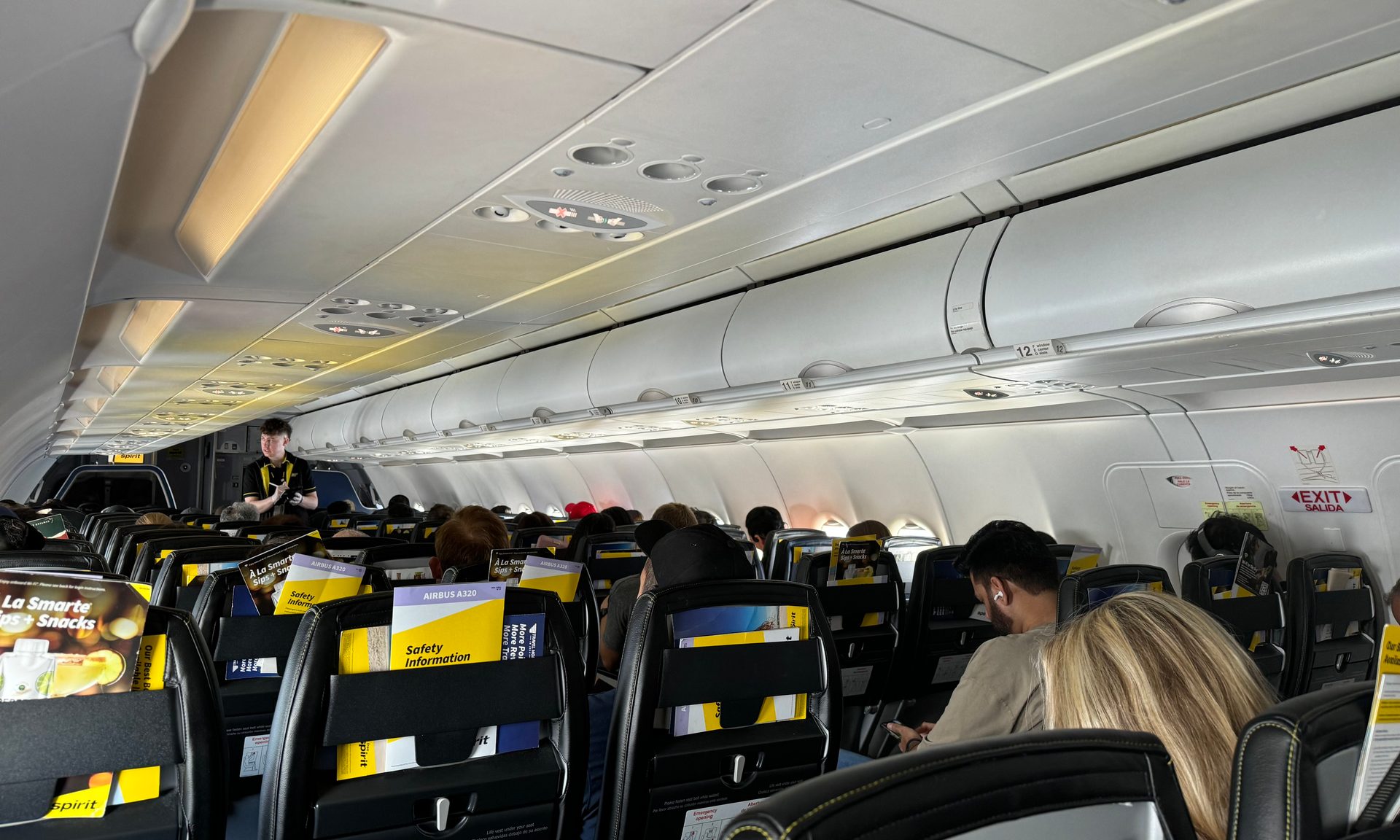
Many or all of the products on this page are from partners who compensate us when you click to or take an action on their website, but this does not influence our evaluations or ratings. Our opinions are our own.
Spirit Airlines is a U.S.-based, budget airline. Given that, expect low airfares on the outset — but with strong potential for costs to increase throughout your journey.
Spirit Airlines charges additional fees for practically everything — from printing a boarding pass at the airport to selecting a seat to bringing a carry-on back. Even a soda served as part of the in-flight beverage service costs extra. That's a stark contrast from the many legacy airlines that typically include these things for free.
So is Spirit Airlines any good? This barebones airline can sometimes work for you — particularly if you don't have a bag and don't need niceties like an inflight drink anyway. But if you're not prepared, this budget airline might end up costing you more in the end than even a higher-end airline.
» Learn more: The best airline credit cards right now
Spirit Airlines reputation
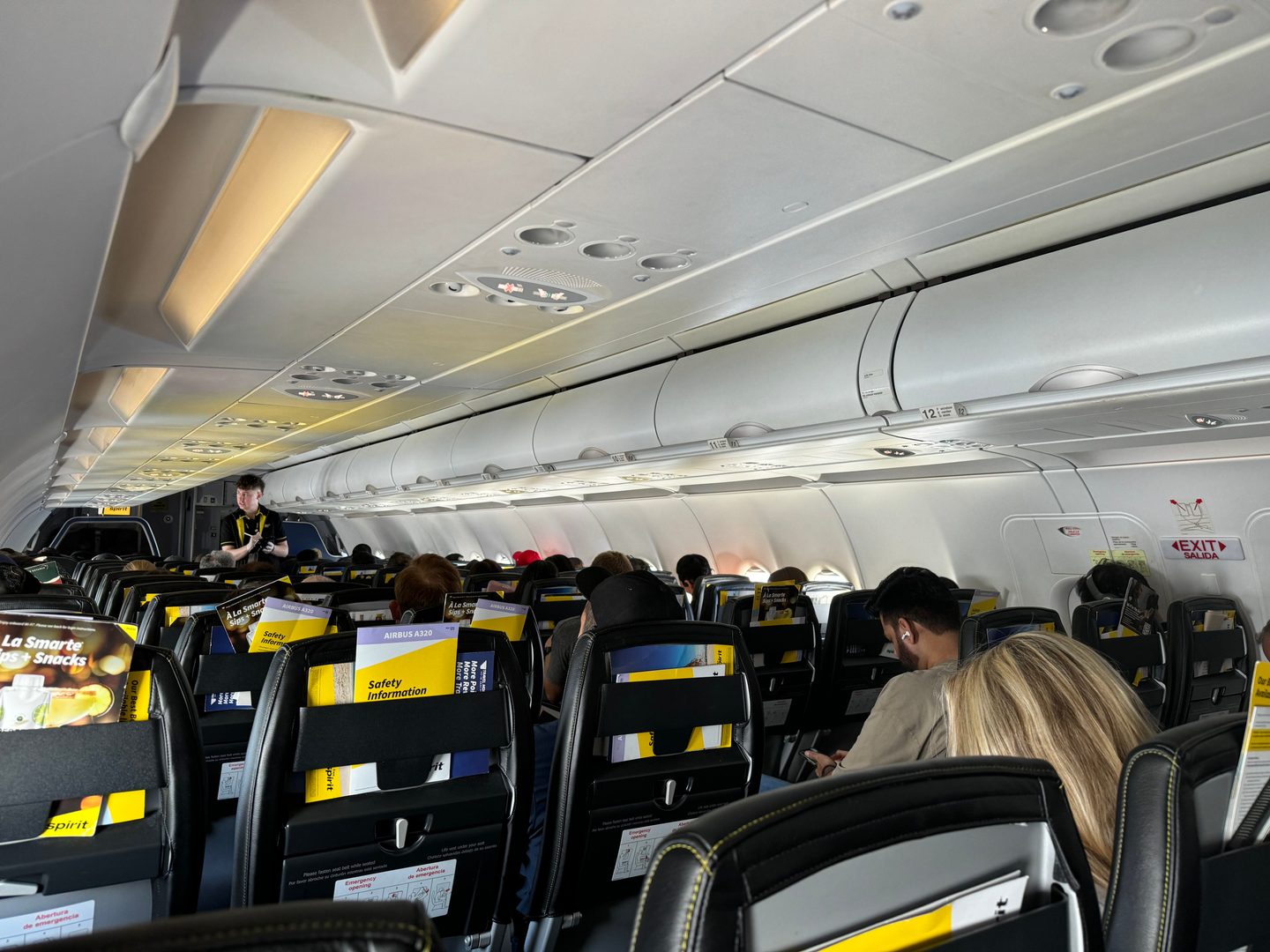
Customer reviews of Spirit Airlines customers offer no shortage of scathing criticism.
But when you look closer, you’ll notice a pattern — while many of the criticisms of the airline are based on substantive grievances, those grievances are usually rooted in a misunderstanding of two things:
- Spirit Airlines charges a fee for almost everything beyond a seat from point A to point B.
- Spirit Airlines has a limited schedule and does not have interline agreements.
» Learn more: Your guide to airline alliances
The American Customer Satisfaction Index (ACSI) Travel Study 2023-2024, which surveyed more than 16,000 people via email between April 2023 and March 2024, sheds some clear light on how travelers feel about Spirit Airlines. In short, not good.
ACSI’s study ranked nine major U.S. airlines on a scale of 0-100. Spirit came in last place of all the airlines, with a paltry 67.
But it's not all bad news. While Spirit still ranks lowest overall in customer satisfaction of any airline, its score also saw the greatest increase. The airline has made its myriad fees more transparent. Rather than feel blindsided, customers who come in prepared to pay a la carte have a better experience.
That said, the fees are high. Here's what you need to know about Spirit Airlines fees.
What fees does Spirit Airlines charge?
Like other airlines, Spirit Airlines charges fees for things you might expect, like checked bags. But unlike full-service carriers, Spirit will charge you more than $4 for a soda. There's a $25 to print a boarding pass, or even an additional fee to book your ticket online.
If you’re going to fly Spirit, understand the fees you’ll pay. Here are some of the fees you should keep in mind.
Checked and carry on bags
Unlike many full-service airlines, Spirit Airlines charges additional fees for checked and carry-on bags. If you want to take more than a personal item, such as a purse or laptop, you’ll need to pay. A baggage allowance can be purchased when booking your trip or can be added later.
You’ll want to be sure that you purchase your baggage allowance before arriving at the airport — once you arrive at the reservation counter or gate, fees for both carry-on and checked bags increase substantially.
While the airline no longer publishes a set schedule for baggage fees, you can find current baggage prices on Spirit’s optional fees page.
Using a standard ticket on Spirit Airlines flight from from Austin to Atlanta as an example, for your first checked bag you would have to pay:
- $36 during a Spirit.com booking.
- $38 before online check-in.
- $44 during online check-in.
- $89 during airport check-in.
- $99 at the gate.
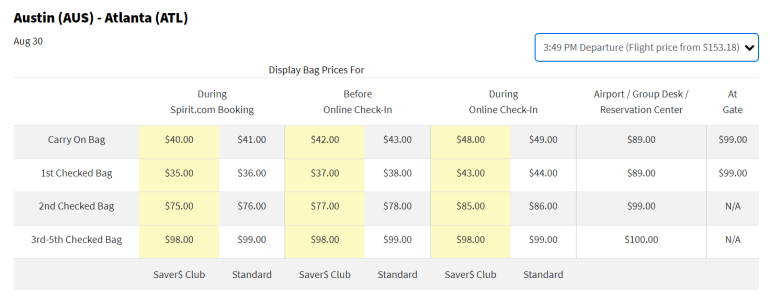
The longer you wait, the more you pay.
» Learn more: What you need to know about Spirit Airlines fees
Seat selection
Most legacy airlines allow customers, even those with no frequent flyer status, to select seats in advance when traveling on non-basic economy fares. With Spirit, you’ll need to pay if you want to select your seat either before or after check-in. If you don’t want to get stuck in a middle seat, it’s probably best to expect to pony up the $1 to $200 that Spirit will charge for a regular seat assignment.
Like luggage prices, seat selection prices can vary by itinerary and tend to be less expensive if you select your seats when you book your flight.

By signing up, you will receive newsletters and promotional content and agree to our Terms of Use and acknowledge the data practices in our Privacy Policy. You may unsubscribe at any time.
Boarding passes
You might not think that you’d need to pay to get your boarding pass from an airport kiosk. After all, most airlines no longer print boarding passes on pre-printed ticket stock — many boarding passes are printed on cheap thermal paper. But with Spirit Airlines, you’ll have to pay $25 for the privilege of getting your boarding pass at the airport.
Drinks onboard the aircraft
Want a glass of water or a soda onboard the aircraft? You’ll need to pay. Spirit Airlines offers no complimentary beverage service onboard, so you’ll end up paying $7 if you just need a drink of water and a small snack. If you want more substantial food or alcoholic beverages, you could end up paying $38 or more.
On-time performance
One metric you can use to determine if an airline is good is its ability to complete its scheduled flights on time. Unfortunately, Spirit Airlines doesn’t look great when you start to dig into its operational performance.
Spirit Airlines had an on-time arrival rate of only 60.7% and a flight cancellation rate of 3.6% according to the June 2023 Air Travel Consumer Report. This puts the airline at the bottom among major airlines in the United States for both delays and cancellations. As a comparison, Delta Air Lines, which ranked No.1 for on-time performance had a 79.8% rate of on-time flight operations and only a 2.3% cancellation rate.
Spirit’s dismal on-time performance and higher than average cancellation rate means that you should expect some measure of schedule disruption when flying on the airline. Unfortunately, because of Spirit’s schedule and lack of interline agreements, the airline is less than well-prepared to handle irregular operations.
Limited schedule
Though Spirit flies to more than 90 destinations across the U.S., Latin America, and the Caribbean, it still runs a much more limited schedule than many legacy airlines. While you might expect a legacy airline like Delta Air Lines or United Airlines to be able to get you to your destination any day of the week, that is not the case with Spirit.
For example, if you look for flights from Kansas City to Nashville, you will find that the airline can’t get you between those two cities on Tuesday or Wednesday. If your Monday flight to Nashville cancels, you’ll most likely be waiting until Thursday to be rebooked, if space is available at all.
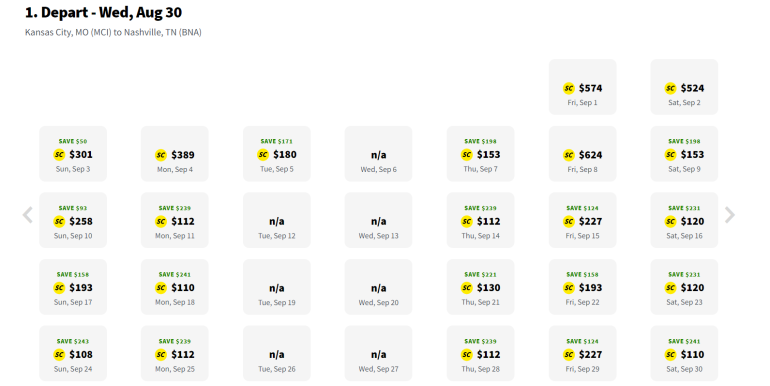
The lack of schedules means that there are limited options to rebook on Spirit when your flight gets canceled.
No interline agreements
Another tool that many airlines have to handle flight disruptions is interline agreements. An interline agreement is an agreement between airlines that allows one airline to sell tickets on another airline. Interline agreements also define how the airlines interface together to provide service to customers. These agreements are the reason you can fly domestically within the U.S. on one carrier and connect to an international flight on another.
Spirit Airlines does not have interline agreements with other carriers, meaning that the airline can only book you on its own planes if things go wrong. While United Airlines or American Airlines might be able to put you on Delta Air Lines or Alaska Airlines if they don’t have the capacity to get you to your destination, Spirit Airlines simply can’t do this. The airline must either rebook you on its own flight or cancel and refund your ticket.
The Spirit Airlines in-flight experience
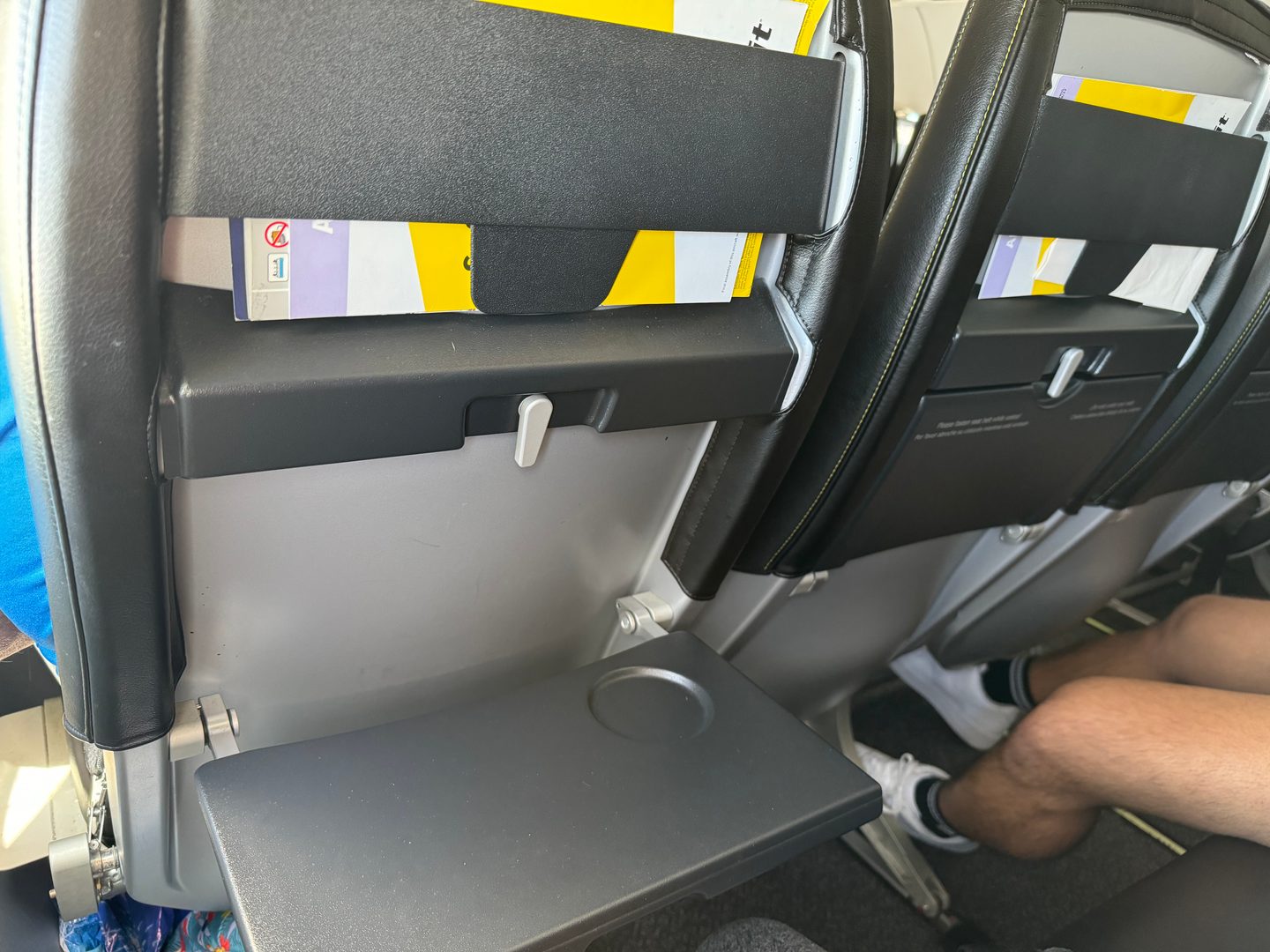
The seats don’t recline, and the tray tables are tiny, which might be uncomfortable for some. But if you're someone who dreads the moment when the person in front of you reclines into your lap, this might actually be a perk. The upright seats and compact tray tables may not be ideal for long-haul flights, but it's not a dealbreaker for shorter journeys.
And go back to the airline’s high fees for carry-on bags. Most passengers either opt to check their luggage or manage with just a personal item, which is included in the base fare. The result? Boarding and exiting the plane becomes remarkably faster. With fewer people fighting for overhead bin space, the whole experience feels more streamlined.
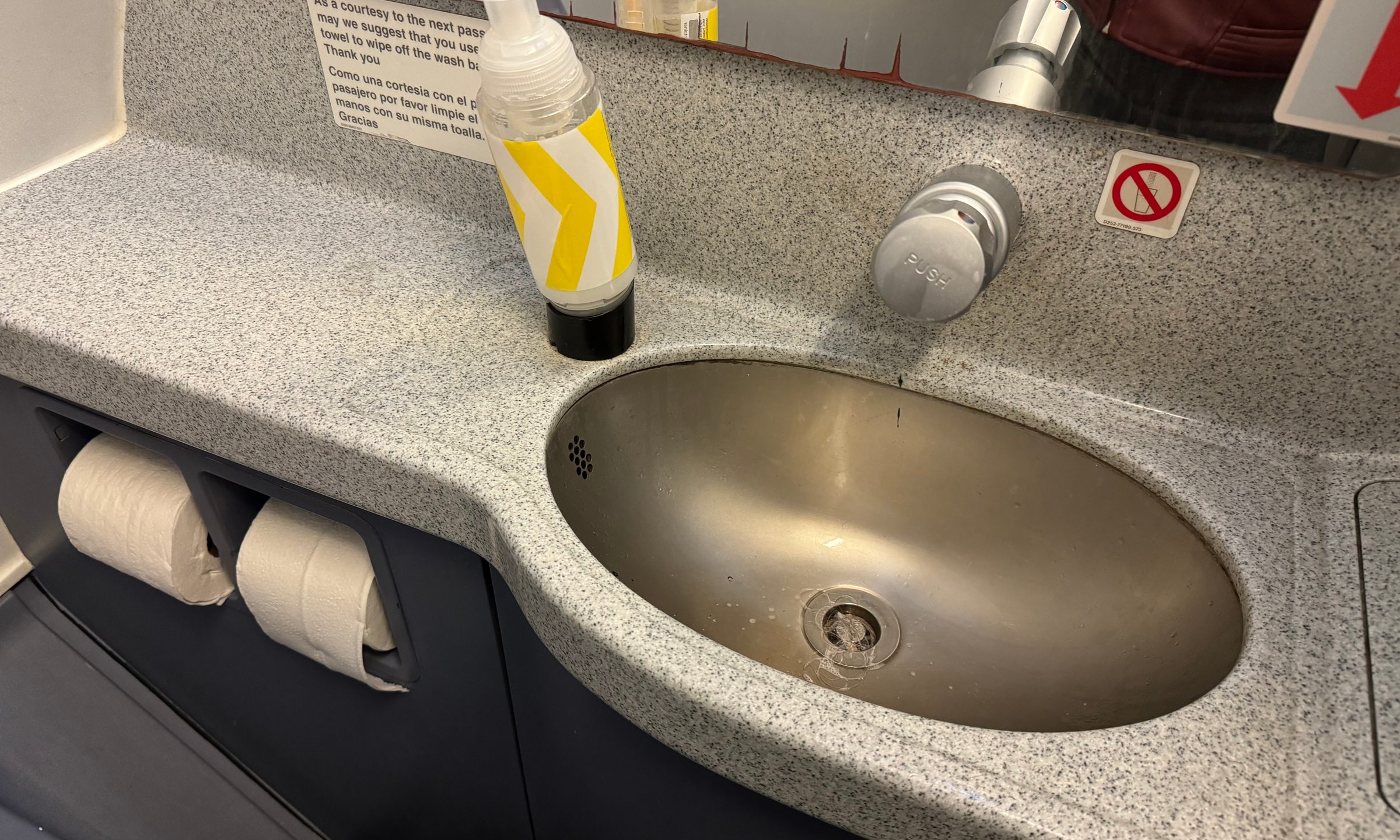
Otherwise, most fixtures on Spirit Airlines are on par with any other standard economy class experience. Sure, the bathrooms are nothing like the bathrooms on Emirates first class, where you'll get a shower and heated floors. But what were you expecting? The wash basins are typically clean, the toilet paper is stocked and the soap smells quite good.
Is Spirit Airlines a good airline, and should you fly them?
If Spirit Airlines offers a substantially lower price than the alternatives on a schedule that works for you, be sure that you include all of the fees you might pay — carry-on and checked baggage, seat selection, boarding pass printing fees, and in-flight food and beverage — into your value calculation.
Often, when you add in all of the necessary “extras” flying the airline may not be substantially cheaper than flying on a legacy airline. Then again, Spirit's low base fares can save you significant cash if all you need is a seat. If you don’t mind sitting in the middle (since seat selection costs extra), and you can skip the extras like snacks and in-flight entertainment, your wallet will thank you. For frugal travelers, this model is ideal.
Just weigh the risk of irregular operations. With one of the highest rates of delayed flights and cancellations in the U.S. airline industry, there’s a good chance your Spirit flight will be delayed or canceled. And if this happens, be aware that your rebooking options may be limited, and your best option to get home might be to purchase an expensive last-minute ticket on another carrier.
Overall, Spirit Airlines is a great option for travelers looking to save on airfare, as long as you're willing to give up a few creature comforts in exchange for keeping your trip under budget. The key is understanding what you're paying for—and what you're not.
How to maximize your rewards
You want a travel credit card that prioritizes what’s important to you. Here are some of the best travel credit cards of 2026:
- Flexibility, point transfers and a large bonus: Chase Sapphire Preferred® Card
- No annual fee: Wells Fargo Autograph® Card
- Flat-rate travel rewards: Capital One Venture Rewards Credit Card
- Bonus travel rewards and high-end perks: Chase Sapphire Reserve®
- Luxury perks: American Express Platinum Card®
- Business travelers: Ink Business Preferred® Credit Card
Article sources
NerdWallet writers are subject matter authorities who use primary,
trustworthy sources to inform their work, including peer-reviewed
studies, government websites, academic research and interviews with
industry experts. All content is fact-checked for accuracy, timeliness
and relevance. You can learn more about NerdWallet's high
standards for journalism by reading our
editorial guidelines.
Limited Time Only: Earn $1,000 Toward Travel!
Capital One Venture Rewards Credit Card 
Travel

For a limited time, the
Capital One Venture Rewards Credit Card is offering new cardholders an especially rich bonus: Enjoy $250 to use on Capital One Travel in your first cardholder year, plus earn 75,000 bonus miles once you spend $4,000 on purchases within the first 3 months from account opening - that’s equal to $1,000 in travel!
More like this




